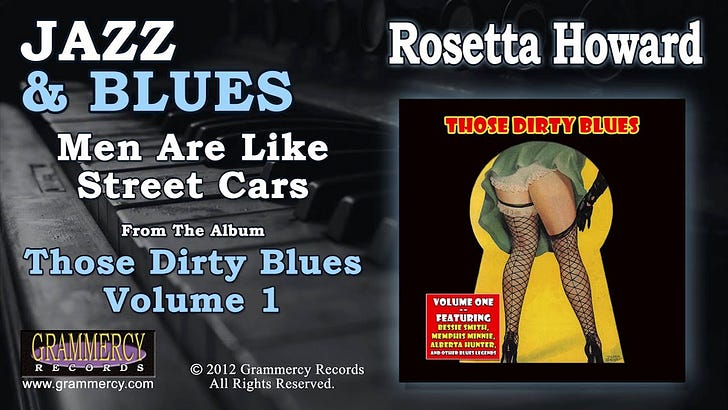Rosetta Howard – “Men Are Like Street Cars” 1939 available on Women Blues Singers 1928-1969. Some metaphors have simply outlived their cultural sell by date. In 1939, if you lived in a big city, street cars were ubiquitous, and they really did keep coming every few minutes. For a long time, buses filled a similar role, but they’ve slowed down their schedule most of the time. So, maybe, an updated version of this song might have to be “Men Are Like Ubers,” but I don’t think I’m clever enough to write it myself. Rosetta Howard is not the most famous blues singer of her era, but I like the warmth and clarity of her vocals. She worked with a lot of famous musicians, including, on this track, Barney Bigard on clarinet and Henry “Red” Allen on trumpet. You have to appreciate the confidence she has in her ability to catch the next man who comes along.
Merle Haggard & George Jones – “Yesterday’s Wine” 1982 from A Taste of Yesterday’s Wine. In a genre known for its duets, perhaps the finest country music combination of two star voices is that of Merle Haggard and George Jones. Man, the way their voices manage to blend yet remain distinct is downright magical. It certainly helps that their vocal ranges match – I think Jones had a wider range than Haggard, but he was more than comfortable singing the notes Haggard owned. This Willie Nelson song was just over ten years old when they recorded it. Willie sang it as if he was addressing a person joining him at the bar, but the duet version convinces us it’s a conversation between two friends already there. It’s a song about feeling the pull of the past, and also about aging as something not to be feared. In this record, however, it’s also a song about the glory of two supreme singers trading lyrics and coming together in spine-tingling harmony.
Merl Lindsay & His Oklahoma Nite Riders – “I’m a Plain Talkin’ Man From the West” circa late 1940s available on Early Country and Western from Bullet Records of Nashville. There were dozens and dozens of Western Swing bands roaming the land for about twenty years from the late 1930’s to the late 1950’s. Lindsay’s was typical – they’re quite good if not exactly up to the level of the giants of the field. This song is a jaunty declamation of what would make life complete – “I’ve got my horse, my saddle, my home / And I’d like to settle down and never roam.” What’s missing? A gal so he can have some plain talkin’ kids. The pedal steel on this cut is exemplary, and there’s also a cool instrumental break featuring said steel followed by fiddle, electric guitar, and tenor saxophone. It all coalesces into a delightfully infectious little record.
Hank Penny – “Now Ain’t You Glad” 1950 available on 28 Big Ones. Sticking with Western Swing for another delightful little record, we find Hank Penny singing of his joyous love after staying up all night with the thinnest of all rhyming dictionaries. (Example: “I’ll hang around you / I’m glad I found you.”) It’s not really about the words so much as the enthusiasm he brings to the subject. It’s easy to believe this is the mood he was in the morning after the first time he held hands with his true love. (What? It’s 1950 – you don’t think he had sexual relations outside of marriage?) And, as with so many Western Swing records, the musicians are top notch. I’m not sure who is playing pedal steel or accordion, but they each take a hot little solo before none other than Merle Travis jumps in on lead guitar. There’s also a chorus where everybody solos at once like it’s New Orleans in 1917 but with no horns. Sweet!
Lonnie Johnson – “Stay Out of Walnut Street Alley” 1928 available on The Original Guitar Wizard. Lonnie Johnson really was a guitar wizard, capable of playing both jazz and blues at a very high level. This is a low down moan of regret that he had too much cheap gin mules to drink. Of course, this was during prohibition, so who knows what would be in the liquor he bought when he went down that alley? Johnson was not only a great guitar player, but a very effective singer, too. He sounds both aware of the evils of the drink and kinda sloshed at the same time. And his guitar part complements the vocal beautifully. The blues Johnson played and sang were different from the more famous Delta blues – Johnson was born in New Orleans and settled in St. Louis before his recording career took him to New York. This, then, is an example of an early urban blues separate from the women blues singers of the time, though he would soon enough be working with them, too.



This is fabulous!! I LOVE all these old songs. You. Are. Incredible!!
The thinnest of all rhyming dictionaries!